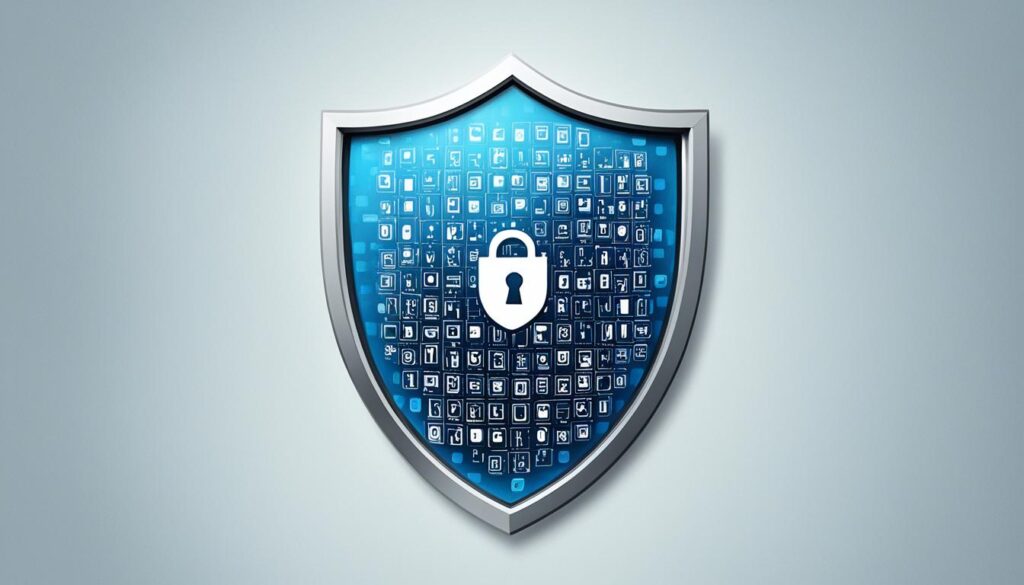Did you know that IPTV services have gained immense popularity in recent years, with millions of users streaming content on various devices? However, with this surge in demand comes a significant concern – IPTV cybersecurity. As you enjoy your favorite shows and movies, your data and privacy could be at risk. In this article, we will delve into the world of IPTV security and provide valuable insights on how to protect your streams from cyber threats.
Key Takeaways:
- IPTV services are vulnerable to cybersecurity threats.
- Data privacy concerns arise when using IPTV.
- Implementing encryption and secure authentication is crucial for protecting user data.
- Network security measures play a vital role in safeguarding IPTV systems.
- By following best practices, you can enjoy a safe and secure streaming experience.
Understanding IPTV Security Risks
When it comes to IPTV, there are significant concerns regarding data privacy and security. Users need to be aware of the risks associated with IPTV services and take proactive measures to protect their personal information from potential threats.
IPTV Security: IPTV poses a variety of security risks that can compromise user data and privacy. These risks include:
- Data Breaches: IPTV platforms can be targets for cybercriminals looking to gain unauthorized access to user information and expose it to external parties.
- Unauthorized Access: Hackers can attempt to gain unauthorized access to IPTV services, potentially leading to data theft or other cybersecurity incidents.
- Malware and Phishing Attacks: Users may encounter malware or become victims of phishing attacks when accessing unsecure IPTV content or interacting with suspicious websites or links.
It is crucial for IPTV users to understand these risks and take steps to secure their IPTV services and personal data. By implementing effective security measures, users can minimize the chances of falling victim to cyber threats.

The Importance of Securing IPTV Services
Securing IPTV services is not just about protecting personal data; it is also about ensuring a safe and uninterrupted streaming experience. By safeguarding your IPTV services, you can:
- Prevent data breaches that could result in identity theft or financial losses.
- Protect your privacy and sensitive information from being accessed or shared without your consent.
- Minimize the risk of malware infections and phishing attacks that could compromise your devices or network.
- Enjoy peace of mind knowing that your IPTV streaming is secure and free from unauthorized access.
Next, we will explore the best practices for securing IPTV services, including data encryption, secure authentication mechanisms, and network security measures that can be implemented to enhance overall cybersecurity.
| Securing IPTV Services | Benefits |
|---|---|
| Implementing data encryption | Protects user data from unauthorized access and ensures the confidentiality of personal information. |
| Using secure authentication mechanisms | Prevents unauthorized access to IPTV services and user accounts, enhancing overall security. |
| Implementing network security measures | Safeguards against external threats, such as hackers, and ensures a secure streaming environment. |
Data Privacy Concerns
When using IPTV services, it is important to be aware of the potential data privacy concerns. IPTV service providers may collect and store your personal information and viewing habits, raising concerns about privacy infringement and unauthorized access to sensitive data. As a user, it is essential to understand how your data is handled and take steps to protect your privacy.
One of the main concerns regarding IPTV data privacy is the collection and storage of personal information. When you sign up for an IPTV service, you may be required to provide personal details such as your name, email address, and payment information. Additionally, IPTV platforms may collect information about your viewing habits, including the channels you watch and the programs you stream.
While data collection is often necessary for service providers to offer personalized recommendations and improve user experience, it also poses privacy risks. Your personal information could be vulnerable to unauthorized access or data breaches if not adequately protected. Furthermore, the collection of viewing habits can raise concerns about targeted advertising or profiling based on your preferences.
To protect your personal information on IPTV, it is crucial to take proactive measures:
- Choose reputable IPTV service providers known for their commitment to data privacy and security.
- Review the privacy policies and terms of service of the IPTV platforms you use to understand how your data is collected, stored, and shared.
- Consider using a virtual private network (VPN) to encrypt your internet connection and protect your online activities from prying eyes.
- Regularly update your passwords and use strong, unique passwords for your IPTV accounts to minimize the risk of unauthorized access.
- Be cautious about sharing personal information or sensitive data on IPTV platforms.
By being vigilant about data privacy and taking these proactive steps, you can enjoy the benefits of IPTV while minimizing the risks to your personal information.
Tips to Protect Your Data Privacy on IPTV
| Tips | Description |
|---|---|
| Choose reputable IPTV service providers | Opt for trusted providers with strong data privacy measures. |
| Review privacy policies and terms of service | Understand how your data is collected, stored, and shared by the IPTV platform. |
| Use a VPN | Encrypt your internet connection to protect your online activities from unauthorized access. |
| Update passwords regularly | Use strong, unique passwords for your IPTV accounts to minimize the risk of unauthorized access. |
| Be cautious with personal information | Avoid sharing sensitive data on IPTV platforms. |
By following these tips and staying informed about data privacy practices, you can take control of your data privacy while enjoying the convenience of IPTV services.

Cybersecurity Threats
When it comes to IPTV, cybersecurity is of paramount importance. Users are vulnerable to various threats, including malware, phishing attacks, and hacking attempts. These threats can have severe consequences, leading to data theft, identity fraud, and financial losses. Therefore, implementing robust security measures is crucial to protect against these risks and ensure a safe streaming experience.
Maintaining IPTV cybersecurity involves implementing a multi-layered approach that addresses both external and internal threats. Let’s take a closer look at the most common cybersecurity threats faced by IPTV users and explore preventive measures to mitigate these risks:
Malware Attacks
Malware attacks pose a significant risk to IPTV users, as malicious software can compromise the security of streaming devices and networks. Cybercriminals use malware to gain unauthorized access to personal information, disrupt IPTV services, or control devices for malicious purposes.
To prevent malware attacks on IPTV:
- Use reputable antivirus software to scan all devices connected to your IPTV network.
- Regularly update software and firmware to patch any security vulnerabilities.
- Avoid downloading content from untrusted sources or clicking on suspicious links.
- Be cautious when installing third-party IPTV applications and always verify their authenticity.
Phishing Attacks
Phishing attacks are a prevalent form of cybercrime that target unsuspecting IPTV users. Attackers impersonate reputable IPTV service providers or use social engineering techniques to trick users into revealing sensitive information such as login credentials, credit card details, or personal data.
To prevent falling victim to phishing attacks:
- Beware of unsolicited emails, messages, or calls requesting personal information.
- Verify the authenticity of IPTV service providers by visiting their official websites.
- Avoid clicking on suspicious links or downloading attachments from unknown sources.
- Enable two-factor authentication (2FA) for an additional layer of security.
Hacking Attempts
Hackers target IPTV systems to gain unauthorized access to user accounts, steal personal information, or distribute illegal content. They exploit security vulnerabilities in devices, networks, or IPTV platforms to carry out these attacks.
To prevent hacking attempts on IPTV:
- Use strong, unique passwords for IPTV accounts and change them regularly.
- Enable device-level security features, such as biometric authentication or PIN codes.
- Regularly monitor your IPTV network for any unusual activities or unauthorized access attempts.
- Consider setting up a dedicated virtual private network (VPN) for added security.
By being aware of these cybersecurity threats and implementing preventive measures, IPTV users can safeguard their data, privacy, and streaming experience. Stay proactive in protecting against cyber threats to ensure a secure and enjoyable IPTV journey.
Best Practices for IPTV Security
Protecting your data and ensuring a secure streaming experience on IPTV requires implementing a set of best practices for IPTV protection, IPTV network security, and IPTV encryption. By following these recommendations, you can safeguard your information and defend against potential cybersecurity threats.
Choose Reputable IPTV Providers
When selecting an IPTV service, prioritize providers with a strong reputation for maintaining high standards of security. Look for providers that employ advanced encryption protocols and have rigorous security measures in place to protect user data.
Use Secure Networks
Connect to IPTV services using secure networks to mitigate the risk of unauthorized access to your data. Utilize encrypted Wi-Fi networks or virtual private networks (VPNs) to create a secure connection and ensure that your streaming activities remain confidential.
Enable Two-Factor Authentication
Add an extra layer of security to your IPTV accounts by enabling two-factor authentication. This feature requires users to provide an additional verification step, such as a unique code sent to their mobile device, along with their username and password. Two-factor authentication helps prevent unauthorized access and ensures that only authorized users can access your IPTV services.
Keep Software Updated
Regularly update your IPTV software and applications to ensure you have the latest security patches and bug fixes. Software updates often include enhancements to security protocols, helping to protect against new and emerging threats. Enable automatic updates whenever possible to streamline the process and ensure you are always running the most secure versions of your IPTV software.
By implementing these best practices, you can enhance your IPTV protection, IPTV network security, and IPTV encryption, reducing the likelihood of falling victim to cyber threats. Safeguard your data and enjoy a worry-free streaming experience.
Encryption and Data Protection
Encryption plays a critical role in safeguarding user data on IPTV platforms. By transforming data into an unreadable format, encryption makes it inaccessible to unauthorized individuals, ensuring the privacy and security of sensitive information. Implementing robust encryption protocols, such as SSL/TLS, AES, or DRM, is essential for securing communication channels and data storage on IPTV networks.
Effective encryption mechanisms utilize complex algorithms to encode data, making it virtually impossible to decrypt without the corresponding decryption key. This means that even if an unauthorized user intercepts data transmitted over an IPTV network, they will be unable to decipher its contents. Encryption acts as a vital shield against potential threats, providing an additional layer of protection for users’ personal and financial data.
When implementing encryption on IPTV platforms, it is crucial to ensure that the chosen protocols and algorithms comply with industry standards and best practices. This helps to guarantee the effectiveness and reliability of the encryption methods employed. Additionally, regular updates and monitoring of encryption systems are necessary to address any emerging vulnerabilities and strengthen overall data protection.
By prioritizing encryption and data protection measures, IPTV providers and users can fortify their networks against potential breaches and cyber-attacks. This commitment to security fosters trust among users, enabling them to enjoy their favorite IPTV programs and services without compromising their sensitive information.
Comparison of Encryption Protocols
| Encryption Protocol | Key Features |
|---|---|
| SSL/TLS | Secure transmission of data over the internet using symmetric and asymmetric encryption |
| AES | Advanced encryption standard with a high level of cryptographic protection |
| DRM | Digital Rights Management ensuring content protection and copyright enforcement |

In summary, encryption is a crucial component of IPTV cybersecurity, providing a robust defense against unauthorized access and data breaches. By implementing encryption protocols and staying vigilant in maintaining their security measures, IPTV platforms can create a safe environment for users to enjoy seamless and protected streaming experiences.
Secure Authentication Mechanisms
Implementing secure authentication mechanisms is crucial for ensuring the protection of IPTV services and user accounts. By utilizing strong passwords, PINs, biometrics, or tokens, users can significantly reduce the risk of unauthorized access.
Two-factor authentication (2FA) is an effective method of enhancing security on IPTV platforms. With 2FA, users are required to provide not only a password but also a secondary verification method, such as a code sent to their mobile device or a fingerprint scan. This additional layer of authentication makes it much harder for unauthorized individuals to gain access to IPTV accounts.
To further enhance security, it is important for users to create and maintain strong passwords. A strong password should be a combination of uppercase and lowercase letters, numbers, and special characters. Regularly updating passwords and avoiding the use of easily guessable information, such as names or birthdates, is also recommended.
Additionally, the use of biometrics, such as fingerprint or facial recognition technology, adds an extra layer of security. Biometric authentication is unique to each individual, making it extremely difficult for unauthorized users to impersonate someone’s identity.
Implementing a secure authentication mechanism not only protects users’ personal information but also ensures the integrity of the IPTV service itself. It is recommended that IPTV providers prioritize the use of robust authentication methods to safeguard user accounts and maintain customer trust.
Benefits of Secure Authentication Mechanisms:
- Prevents unauthorized access to IPTV services and user accounts
- Enhances security by implementing two-factor authentication
- Reduces the risk of data breaches and identity theft
- Provides peace of mind for users

| Secure Authentication Mechanisms | Advantages |
|---|---|
| Strong Passwords |
|
| Two-Factor Authentication |
|
| Biometric Authentication |
|
| Tokens |
|
Network Security Measures
When it comes to safeguarding your IPTV system from external threats and unauthorized access, implementing network security measures is paramount. These measures fortify your network infrastructure and ensure the protection of sensitive data and user privacy. Let’s explore some essential steps you can take to enhance IPTV network security.
Firewalls
Firewalls act as a barrier between your IPTV network and potential threats from the internet. By analyzing network traffic and filtering out unauthorized connections, firewalls prevent malicious actors from gaining access to your system. It’s crucial to have firewalls in place at both the network perimeter and individual devices to create secure communication channels.
Intrusion Detection Systems (IDS)
An Intrusion Detection System (IDS) monitors network traffic, analyzing it for any signs of suspicious activity or potential cyber threats. IDS alerts administrators when it detects any unauthorized access attempts, ensuring a proactive defense against security breaches. By promptly identifying and mitigating security incidents, IDS plays a crucial role in maintaining IPTV network security.
Virtual Private Networks (VPN)
A Virtual Private Network (VPN) creates an encrypted tunnel between your device and the IPTV service provider, ensuring secure data transmission. By routing your internet traffic through a remote server and masking your IP address, VPNs protect your privacy and prevent eavesdropping. Utilizing a VPN is especially important when accessing IPTV services over public Wi-Fi networks, where the risk of interception is higher.
Implementing network security measures such as firewalls, IDS, and VPNs helps protect your IPTV system from external threats and ensures the integrity of your data. However, it’s vital to regularly monitor your network and employ threat detection techniques to identify and mitigate any security incidents promptly.

By prioritizing IPTV network security, you can enjoy a safe and worry-free streaming experience, knowing that your data and privacy are protected. Implement these measures to safeguard your IPTV system and stream your favorite content with peace of mind.
Conclusion
Prioritizing cybersecurity is crucial in the ever-evolving landscape of IPTV. As the popularity of IPTV continues to grow, so do the risks associated with its use. However, by understanding the potential threats, implementing best practices, and staying informed about emerging cybersecurity challenges, users can enjoy a safe and secure streaming experience.
Protecting your data and privacy is paramount when using IPTV services. By choosing reputable IPTV providers, using secure networks, enabling two-factor authentication, and keeping software updated, you can reduce the risk of data breaches, malware attacks, and unauthorized access to your personal information.
Remember, encryption is essential for safeguarding your data while streaming. Implementing encryption protocols ensures that your sensitive information remains unreadable to unauthorized users. Additionally, adopting secure authentication mechanisms and employing network security measures, such as firewalls and virtual private networks (VPNs), further enhance the overall security of your IPTV experience.
Stay vigilant and proactive in addressing any potential security threats. By following these best practices and remaining aware of the ever-changing cybersecurity landscape, you can unlock the endless entertainment possibilities offered by IPTV services while keeping your data and privacy intact.
FAQ
What are the risks associated with IPTV in terms of cybersecurity?
How can I protect my data and privacy while using IPTV?
Why is encryption important for IPTV?
What authentication mechanisms can I use to enhance IPTV security?
How can I protect my IPTV system from external threats?
What should I do to ensure the security of my IPTV services?






